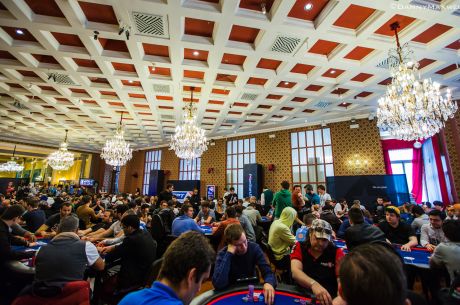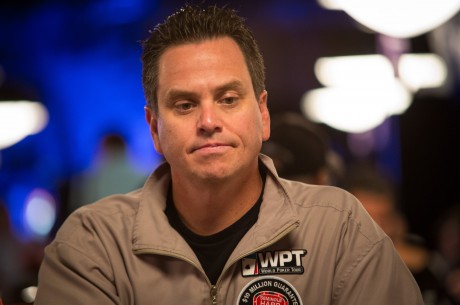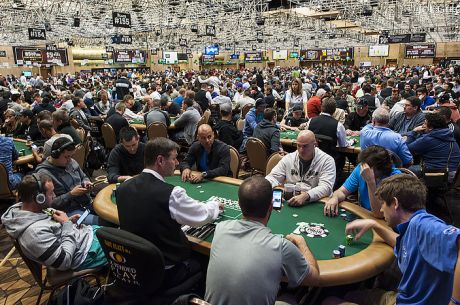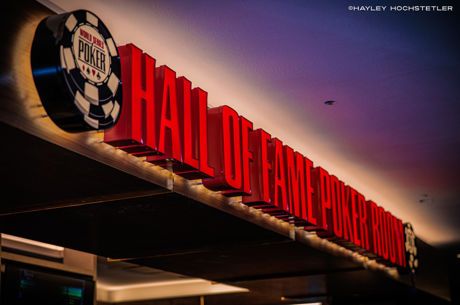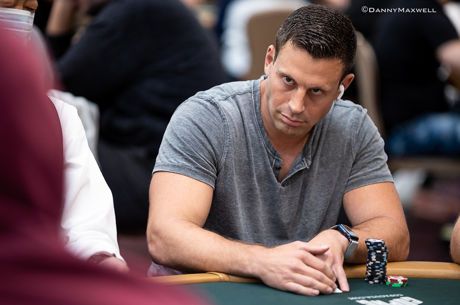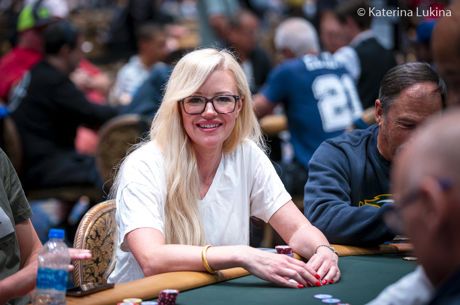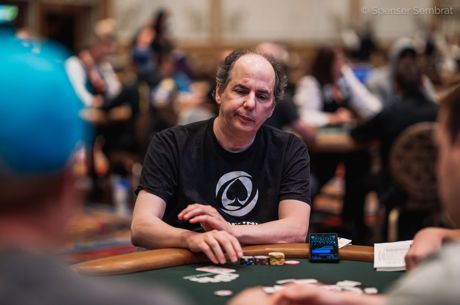Are Tankers Sinking Poker's Ship?
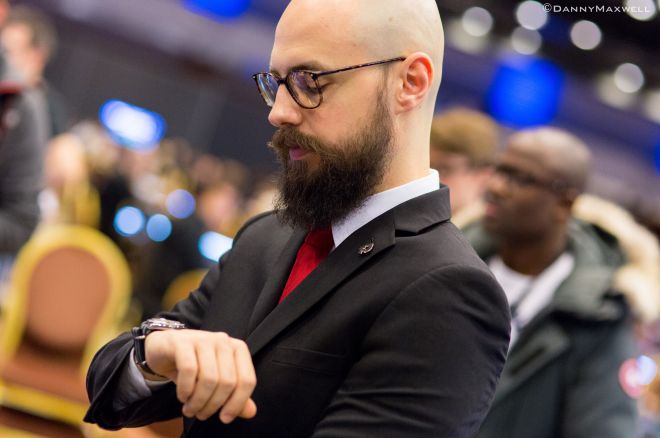
Before you continue reading this profile of poker's excessive tanking debate, a pair of informative mental exercises is encouraged:
First, set the stopwatch on your smartphone for 180 seconds, and simply stare at the screen until that time has fully elapsed. If you resisted the urge to press pause and read on, you just replicated the often torturous experience of waiting for an opponent to make a single decision during a tournament. With that three-minute wait fresh in your mind, would you still enjoy the game if every street of action sunk you into such a state of suspended animation?
Next, set that same stopwatch and imagine a scenario in which a single decision represents a crucial turning point in your own life. One that, if made correctly, can determine the difference between a million dollar payday and the mother of missed opportunities. When you see how fast the clock reaches zero as the stakes rise, does a three-minute window really provide sufficient time to contemplate such a significant choice?
This paradox is worth pondering because in tournament poker the countdown of a running clock governs the game's very progression. As each level bleeds into the next, the passage of time applies increasingly pronounced pressure to surviving players. Compelled to continually build their stack, rather than succumb to the slow erosion of blind bets and forced antes, tournament pros know all too well that time truly is money. Measuring efficiency in hands-per-hour, experienced players are always aware when their long-term equity is being compromised by lollygaggers.
Nevertheless, most regulars on the circuit also take their sweet time while pondering the toughest spots �� searching for tells, calculating odds, and mentally replaying previous hands. Generally, the process of tanking is grudgingly accepted within the poker community, as most players realize that they too will need to think things through on occasion. The clock can always be called �� and certainly, it often is �� but the boundaries of etiquette usually dictate a tacit truce between moderate tankers and their more fast-paced opponents. Human beings are creatures of habit, however, and for poker players this maxim holds particularly true. This has led to a curious phenomenon wherein a select group of pros choose to tank on nearly every hand, taking a full minute or longer before many basic actions.
Well-known pros like Byron Kaverman, Yevgeniy Timoshenko, and David "Doc" Sands have become notorious for their lengthy delays over the last few years �� and Kaverman's infamous eight-minute tank with no pair during last year's World Poker Tour World Championship final table set the bar. In a vacuum, prolonged periods of reflection like Kaverman's epic tank job can be justified, especially so when the stakes and circumstances behind certain spots are fully considered. But when seated alongside a tanker who habitually takes things too far, other players at the table are forced to watch their precious hands-per-hour rate sliced in half through no fault of their own. And for many pros, the time to take a stand against excessive tanking has arrived.
A debate recently erupted over Twitter during the WPT's Bay 101 Shooting Star event, after circuit regular Jordan Cristos posted a complaint about the WPT policy mandating shortened levels during televised final table. Tournament Director Matt Savage responded by reminding the former WPT Legends of Poker champion of his own deleterious impact on tournament structures through the following tweets:
@jcinblue you have taken the lead in the race for "slowest player on the tour!" Multiple complaints across multiple venues. #BadForTheGame
— Matt Savage (@SavagePoker)
@jcinblue do you realize that how slow you are affects the structure just as much if not more than level times? #PlayFasterPlease
— Matt Savage (@SavagePoker)
Cristos fired back with a staunch justification of his tanking, explaining his position succinctly with this pair of tweets directed to Savage:
@SavagePoker poker is a game of patience and I'm fine with making k's while they complain. #goodformygame #cameforme #tankingchangedmylife
— Jordan Cristos (@jcinblue)
@SavagePoker complaints from the same bosses and/or amateurs dont count. If u respect the game/money on the line u respect my tank.
— Jordan Cristos (@jcinblue)
From there, multiple pros jumped into the thread to offer their own thoughts on excessive tanking. The majority chided Cristos for taking an inordinate amount of time on straightforward decisions, a few others defended his right to preserve hard-earned equity at all costs, and Cristos exchanged playful yet pointed banter with both groups. Respected pros like JC Tran, Dan Smith, Matt Stout, Darryll Fish, Joseph Cheong, Josh Arieh, Christian Harder, Tyler Patterson, and Roman Valerstein each offered their version of the anti-tanking take, with several providing direct examples of excessive waits they had endured. A few choice tweets issued by that contingent have been collected below:
@RealKidPoker @jcinblue @SavagePoker yesterday I sat with u and the tanking was a bit out of line. By midday others did the same. Unreal
— JC TRAN (@jctran23)
@RealKidPoker @jcinblue @SavagePoker tanking is fine in big decisions. But tanking first to act wasn't cool. No structure can handle that
— JC TRAN (@jctran23)
@jcinblue @DarryllFish @BryanMicon @MattStoutPoker as a winning player getting most hands in is higher ev than most gain by tanking, IMO
— Dan Smith (@dansmithholla)
@jcinblue @SavagePoker No one respects your tanks nor should they. They're excessive, annoying, and unfair to other players. #CLOCKPLEASE
— Matt Stout (@MattStoutPoker)
@msalsberg @BryanMicon @MattStoutPoker @SavagePoker @jcinblue can't complain about short levels when u blatantly cause fewer hands/hr
— Tyler Patterson (@TylerPoker)
@DarryllFish @BryanMicon @jcinblue what if someone is legit thinking deeply for 10 mins about every decision? Should we let them?
— Christian Harder (@realcharder30)
As he is known to do, Daniel Negreanu also made his presence felt and his position known. After debating Cristos directly on the consequences that excessive tanking can have on the health of tournament poker itself, Negreanu took to his blog to pen a scathing rebuke of the practice.
Meanwhile, players like Zo Karim, Bryan Micon, and Sarah Tolagson (Cristos' girlfriend and a fellow pro) joined in to offer their rebuttals. Karim pointed out that Cristos violates no rules by routinely tanking, stating flatly "he has the right to tank and you have the right to call the clock." Meanwhile, Micon advocated a libertarian approach to tanking, stating his position that Cristos should be allowed to tank in perpetuity because he "thinks much deeper than most about hands."
For readers who would rather avoid sifting through the lengthy thread in its entirety, the following exchange between Cristos and Fish exemplifies the arguments put forth by both sides:
Darryll Fish: There are super high-level thinkers who act very fast. This would be reasonable if it were commonplace for high-level thinkers to tank as long as you on average, but nearly all of the world's best players act significantly faster. You act as if such tanking is necessary to play expert-level poker, but it clearly is not.
Jordan Cristos: I understand most do not need the time. I need it for big decisions though. No big deal right?
Fish: Correct, tanking on big decisions is acceptable, taking 30 seconds or more to open preflop isn't.
Cristos: If you were a spewbox like me then you'd know every decision is a big decision.
Fish: I love you, but you will never convince me that opening the button is a "big decision."
Cristos: Putting chips in the pot is always an important decision unless they're blinds or antes.
Fish: Important? Maybe. Cause for deep analysis by someone who plays full-time? Hardly. I will not be convinced that a full-time player opening preflop early on in a tournament needs time for "deep thought."
Cristos: Sometimes I play fast, sometimes I play slow. You're all locked in on a handful of slow days. I acknowledge a lot of peers and elites disagree with me, but that won't change who I am or how I operate. I understand where you guys are coming from but you refuse to find middle ground other than berating.
Fish: I guess you're just having trouble being objective about this. Good luck, and sorry if I clock ya.
The great tanking debate continues unabated, a fact demonstrated two days after the original argument began, when Jake Bazeley took Kaverman to task on Twitter. By asking rhetorically, "First two hands at new table... does anyone play slower than Byron Kaverman? Only partied with him, never played, this is absurd," Bazeley continued the poker world's collective criticism. When asked about his propensity for prolonged tanks, Kaverman responded simply by saying "actually been making it a point to play a lot faster, so I'm not sure what I could say to help as far as a counterpoint."
With so many players sounding off on unwarranted tanking in big-time tournaments, PokerNews took the time to speak with Savage, Negreanu, Stout, and Allen Kessler �� all of whom are concerned about the consequences of excessive tanking. Here's what they had to say:
Savage Encourages Players To Use Their Right To Call the Clock
"It was actually a tweet I made to Jordan after multiple players, dealers, and even a staff member complained about him taking too much time at the Bay 101 Shooting Star event. First of all, let me say I like Jordan and we are in regular communication, and after that day there hasn't been any complaints. He played most of Day 2 at Bay 101 and finished seventh at Thunder Valley.
"I actually had multiple problems with Peter 'Young Man' Tran for slow play at (the L.A. Poker Classic), and he was far worse than Jordan in my opinion.
"My biggest complaint about habitual tankers is that it takes away from the enjoyment for others, especially the amateurs, and can actually cause them to leave the game. I've heard from others for years how they hate how slow the game is. My least favorite thing about a tanker is when he says he uses it to tilt other players on purpose because it puts people off their game. I also dislike that tanking hurts the structure of the tournament, and it's unfair for one table to be playing so much slower than the others.
"I really feel that players need to exercise their right to call the clock; it is an option and they should feel free to do so without fear of repercussions in any tournament I am a part of. Many people don't know that there is a Tournament Directors Association rule on the books that the clock will be reduced by 10 seconds each time the clock is called on the same player."
Kessler Offers a Unique Rule
"Excessive tanking hurts everyone. Players at tables with excessive tanking get less hands in and have less opportunity to build up stacks. Jordan Cristos and David 'Doc' Sands are both notable tankers.
"A shot clock isn't necessary. A simple time, approximately two minutes, should precede calling the clock. My idea, which I posted on Twitter, would solve the whole issue:
"The floor man would come to the table and ask the dealer if the player had enough time. Then the floor would say 'you have one minute to act on your hand, if you elect to fold your hand will be shown to the table.' At that point the player could muck or have the clock started. This would solve most of the problem as often the tanking is with uncallable hands."
Negreanu Comes In Prepared To Call the Clock
"There's a parallel that I didn't mention in my blog, between poker and golf. In golf, the players on tour vary in terms of how much time they take before a shot, right? And some would argue, like the pro-tankers, that the longer you take the better off you're going to do. However, there's also a sense of respect for fellow players and for the game, that even though you might want to take 10 minutes before a shot, you don't do that. Because you don't want to play too slow. That's disrespectful to other people's time when you turn a four-hour round into a six-hour round. They do have a shot clock in golf that's similar to poker, where if a guy's taking too long, eventually you put a clock on him. And he's got to pick up the pace, right?
"With poker we don't have any option for doing that, outside of just calling the clock on people. The problem with it is, for many years it's been considered like a personal attack or taboo to call the clock on someone. And it shouldn't be.
"When a tanker wants to take all this extra time, because it's in the interest of their game, right? That's the argument. Well, calling the clock on an opponent is in the interest of your game, and it's a legal option that players have, and one that they should take. Imagine an extreme situation �� what if every player at the table took 10 minutes to act before every decision? Maybe you can make the argument: 'well, it's my money, I want to make sure I make the right decision.' What would that do? That's the extreme example, right? So, what happens in tournaments when you have too many tankers, is just a smaller version of that. Where, instead of getting 35-40 hands an hour, you're only getting 25, because you have two people who are abusing the amount of time given to them.
"I have a fair system, where when I sit in a poker tournament, the first time somebody tanks and takes longer than two minutes, I give them as long as they'd like �� up to a point obviously. It gets to 10 minutes, I'm always calling the clock. But I give people one free tank. After that, I let them know that I'm calling the clock on them at two minutes, no matter what the situation, no matter what. I let them know this before I sit down at the table, so then at the two-minute mark I just automatically call the clock �� doesn't matter if it's a big river situation or whatever, I just always do it. If they repeat it, and I have to call the clock on somebody again, now I'll move it down to 1:45, then 1:30. I'll continue to lower the number before I actually have to call the clock, and you know, maybe in some extreme cases it goes down to 30 seconds.
"I also want to talk about the good news, though. The good news is it's changing, because in the past, players like 'Doc' Sands, Marvin Rettenmaier, and the Germans were notoriously slow. And then we talked to them all about what's in their best interest, and they understood; they've come to terms with that. And they have sped up play. Really, the threat of the two minutes makes a big difference. Typically when I say to people that I'm going to call the clock after two minutes, it speeds up their play. They're more conscious of the fact that they're taking up other people's time, and that it's a selfish endeavor. Sure, I can make the argument, 'you know what, me taking an hour helps my decisions.' OK, but it's not all about you, it's about what's fair, because if everyone else did that guess what kind of tournament you have: a complete crapshoot with no hands being played per hour.
"If everyone did what you did, would tournament poker be feasible? If everyone was doing what you're doing, would you benefit from it? Or would you suffer greatly? And the answer is, you'd suffer greatly, because if you're a tournament player playing four hands an hour, you don't have much of an edge."
Matt Stout Calls the Clock, and for Common Sense
"The incident that Jordan was referring to on Twitter between he and I happened on Day 2 of a Borgata main event. I hadn't played live with him before that and had no idea what I was in for. By that time I had adopted Negreanu's policy of giving someone the benefit of the doubt the first time they tank, calling the clock after two minutes the second time they tank, and then progressively calling the clock sooner and sooner against constant tankers, especially when they tank in mundane spots.
"I should point out that Jordan and I are friendly, have a bunch of mutual friends, and have hung out a bit outside of poker. Based on that I tried to give him the benefit of the doubt at first, but his tanking became too much for me to handle. One of the most ridiculous examples came when all involved players had 70-80 big blinds or more. The hijack limped and Jordan tanked for over two minutes before I called a clock. His total decision took over three minutes while Borgata TD Tab Duchateau counted down the clock. Tab then stayed around for a little while to observe Jordan's constant and excessive tanking, and even started asking me why he was doing it, if it was strategic, an attempt to tilt opponent's, or what, since Tab knew that I'm friendly with Jordan. I honestly had no idea myself and told Tab that. Based on Tab's observations he told Jordan that the amount of time he would have to act was going to be decreased progressively with each clock after I had called the clock around four times. All told, I believe I called the clock on him eight times that day. Jordan claimed to Negreanu that I started calling the clock on him after under 30 seconds, which is not true. I was watching the clock and waited at least one minute before calling it even when it was preflop decisions facing no action.
"Tanking has really become an epidemic in poker and is bad for the game in multiple ways. Occasionally taking two or three minutes for a huge decision is understandable, but when the same player constantly taking a lot more time to act than his opponents, I find it to be not only selfish and unfair, but counterproductive when the tanker is a winning player. The less hands your table plays, the harder it is to chip up and the more your hand is going to be forced to gamble as the blinds increase, so tankers reduce the ROI and edge of the winning players at the table. The average hand takes approximately two minutes to play out in a live tournament, so every time someone tanks for two minutes they have reduced the number of hands we'll play that level by one. The irony is, even the recreational players who benefit from the luck factor becoming greater are often just as frustrated by the slow pace of the game as the winning players. I've heard many recreational players complain that they came to play, not sit around and wait for players �� usually pros �� to take two or three minutes per decision.
"A lot of people think that a shot clock is the answer, but I don't think it is. I don't think that an online tournament specialist like Jordan Cristos, who has been playing poker for a living for several years, should have the same amount of time to act on his hand before the flop facing no action as a recreational player making a decision for his entire stack on the river at his first major final table. I think many recreational players would be even more intimidated to come play against the pros in major tournaments than they are now. Therefore, I believe the same thing that Matt Savage does, that players need to police themselves by calling the clock a lot more than they currently do. There is still this odd myth that some live players cling to about it being bad etiquette to call the clock. It's not. It's bad etiquette to negatively impact your entire table, including yourself, by allowing other tables to gain an edge by playing more hands than your table per hour.
"I think another idea that hasn't been discussed enough is placing a timer in the well so that dealers can clock decisions themselves. Dealers should be trained to only allow it after a reasonable amount of time has passed, and players could call floor over if and only if they feel that the clock has been called prematurely or unfairly."
Get all the latest PokerNews updates on your social media outlets. Follow us on Twitter and find us on both Facebook and Google+!

